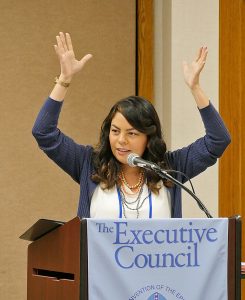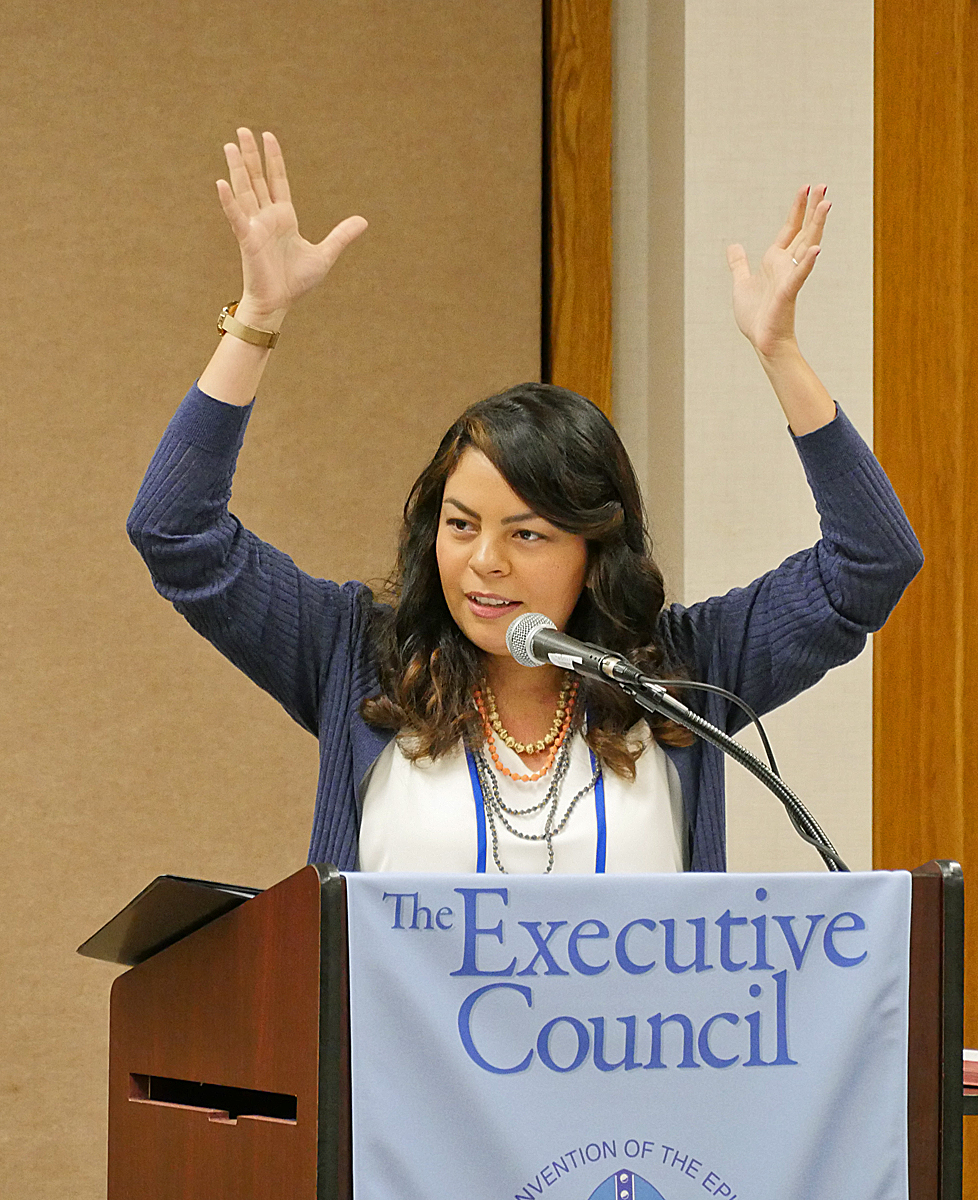
Deputy Julia Ayala Harris preaches at Executive Council. photo: Mary Frances Schjonberg/Episcopal News Service
When I received the email asking me to deliver today’s sermon, I was at a café with a bright teenage girl from my church’s youth group, helping her write her first sermon. I had just said to her, “You’ve been listening to sermons your whole life and you already know what they’re like. So, don’t worry. You got this!” Moments later, an email popped up in my inbox and I saw that I was asked to preach my first sermon at the upcoming Executive Council meeting. Suddenly, all my advice to that teenager seem fake, hollow, and not terribly comforting. I tried to tell myself that my situation was different. I was being asked to deliver a sermon in front of the greatest minds in our church and the greatest preacher of our generation. However, the truth is that it was very much the same. She was to give her first sermon in front of the church community that she has been a part of her whole life and the rector who has been her spiritual leader since she was three years old. So in that sense, it was the same. I said yes to this terrifying opportunity.
The theme for this morning is drawn from The Way of Love practice, “Learn,” which is about reading scriptures. It is ironic to me that is the practice that I have been asked to preach on because it is the practice that gives me the most pause and perhaps a bit of a twitch in my neck. This stems from my life experience and my story.
I was raised in the Catholic church in Chicago where religious education was more about learning the creeds than Bible passages, and prayer was reserved strictly for Cubs games. When I joined a born-again evangelical church in my late teenage years, I quickly found great satisfaction in memorizing Bible passages. This focus on memorization fed the overachiever in me because I could fill a whole poster with gold stars for every passage I learned. Eventually, I would move to memorizing whole chapters. I am grateful for this because I have found Ephesians, chapter six, to be quite helpful to have committed to memory as I have had to reach back for it several times over the past couple of years. Additionally, this Bible memorization, and my poster with all the gold stars, seemed to me to be an outward physical example of proof that I belonged in a faith community.
Like every good evangelical Christian teenager, I went to an evangelical Christian college. In this context I began to go beyond memorizing Bible passages and into the realm of biblical interpretation. This exercise became less enjoyable to both my professors and I as I wrote papers about Lot’s wife, Tamar, the Levite’s concubine, and the first chapter of Job. I wrestled uncomfortably with notions of the nature of our God and how we interact with our holy scriptures. My male professors seemed equally uncomfortable having these conversations. They probably wanted me to be more like my classmates who proclaimed their love of the proverbs and how they found comfort in scripture.
This struggle with our scriptures is part of what drew me to the Episcopal Church, where I discovered that asking questions like these was welcomed, not discouraged. In the Episcopal Church, I was free to not only ask questions about how we understand the nature of our God in Job, chapter one, or through the story of the Levite’s concubine, but I found others who felt similarly uncomfortable. These people inspired me because they were able to continue in their faith despite these struggles with scripture. Also, in the Episcopal Church I learned about other ways to interact with scripture beyond memorization and exegesis, such as centering prayer and Lectio Divina. Our Episcopal toolbox is inclusive of so vary many ways of learning and it is something that we can be proud of!
When I took over the youth ministry program at my local church this past academic year, I used The Way of Love as a guide for the year. And the thing that I was most nervous about covering was “Learn,” because of this personal baggage that I carry with me on this topic. When it came time to do “Learn” with my youth group, I was excited to introduce them to Lectio Divina as a way to read and learn the Bible. Naturally, I believed that I would facilitate for them the most amazing spiritual encounter of their lives. I chose the Beatitudes for this exercise. It was going to be amazing!
So I went ahead with my plan and during the exercise the kids were very quiet. Perhaps because they were having such an amazing spiritual experience. When we finished Lectio Divina in youth group that Sunday, I asked for their feedback. The same teenage girl, who months later I would help her with her first sermon, stated loudly, “I hated this! I did not like this at all!” and the other youth agreed. My well-thought-out and amazing Lectio Divina session went over like a lead balloon.
Months later when I was helping her write her sermon and she asked about the reading from Acts that Sunday, I began to explain that it is this reading that explains why we get to eat bacon. How Peter, Paul and the early church were wrestling with what it meant to be followers of The Way. Did gentiles have to become Jewish first? I went on about Jewish notions of holiness and how it plays out in their culture as well as cuisine. When I looked up at the teen, her eyes were HUGE and I thought, “Oh man, I really blew it!” The she said, “That is so cool!” I instantly learned that I allowed my personal baggage to cut me off from a set of tools in our Episcopal toolbox. I know that I am not alone in this. We all carry some baggage along with us that blinds us to some of these good and useful tools in our Episcopal toolbox that we can offer to others.
I have one more comment before I land the plane and sit down.
I love bathrobes! I love wearing bathrobes. I want a whole collection of bathrobes. One for every season, every mood that I may have, and every liturgical holiday. For example, I want a Pentecost bathrobe. I can picture two ideas for this Pentecost bathrobe. One has like Harley Davidson-inspired flames coming from the bottom. The other is inspired by the phoenix in Harry Potter and maybe it would have red feathers along the collar. I want to have a closet filled with all my bathrobes hung just right. My husband is only vaguely aware of this desire.
When I come home exhausted after a long day, I put on a bathrobe. I wash my face. I put my hair up into a massive bouffant. In doing this, I have put down my baggage for the day. I have stripped away all the pretense and ego that gets me through the day. I am with my family where I am authentic, vulnerable, intimate, and open.
This is very much like when I sit down with our scriptures and prepare for centering prayer. In order to become open to a transformational encounter with scripture, I do these rituals that strip away everything that holds me back from being vulnerable and open to the Holy Spirit. However, the times when I have had truly transformative experiences with scripture is when I have experience scripture in the context of community. The times when we do morning prayer around our tables at these meetings have been some of the most transformational to me and my spiritual journey. In a sense, when we do these morning prayer exercises, it is like we are gathered in our bathrobes, figuratively not literally, in order to have an open vulnerable experience with each other. This is what the Way of Love is all about!
Therefore, let us not be afraid to step into those vulnerable spaces with ourselves, with our Holy Scriptures, and with each other — allowing ourselves to be transformed.
Amen.


